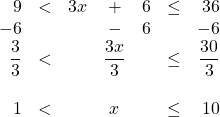Chapter 8.9 Solving Radical Equations
In this section, radical equations that need to solved are discussed. The strategy is relatively simple: isolate the radical on one side of the equation and all variables will remain on the other side. Once this is done, square, cube, or raise each side to a power that removes the radical. For example:
![Rendered by QuickLaTeX.com \begin{array}{ll} \text{For }\sqrt{5x+3}=1,\text{ the solution can be found by squaring both sides}&(\sqrt{5x+3})^2=(1)^2 \\ \text{For }\sqrt[3]{5x+3}=1,\text{ the solution can be found by cubing both sides}&(\sqrt[3]{5x+3})^3=(1)^3 \\ \text{For }\sqrt[4]{5x+3}=1,\text{ the solution can be found by using the fourth power}&(\sqrt[4]{5x+3})^4=(1)^4 \\ \text{For }\sqrt[5]{5x+3}=1,\text{ the solution can be found by using the fifth power}&(\sqrt[5]{5x+3})^5=(1)^5 \\ \end{array}](https://ecampusontario.pressbooks.pub/app/uploads/quicklatex/quicklatex.com-c1b3b71033bc574ac0142a796926d408_l3.png)
Once the radical is removed, then solve the resulting equation. Consider how this strategy is used in the following example.
Example 1
Solve for ![]() in
in ![]() .
.
First, isolate the radical:
![Rendered by QuickLaTeX.com \[\begin{array}{rrrrr} \sqrt{2x+4}&-&6&=&0 \\ &+&6&=&+6 \\ \midrule \sqrt{2x+4}&&&=&6 \end{array}\]](https://ecampusontario.pressbooks.pub/app/uploads/quicklatex/quicklatex.com-8e325fe6ddadb3e46ce676b53098652f_l3.png)
This leaves:
![]()
Squaring both sides:
![]()
This results in:
![Rendered by QuickLaTeX.com \[\begin{array}{rrrrr} 2x&+&4&=&36 \\ &-&4&&-4 \\ \midrule &&2x&=&32 \\ \\ &&x&=&16 \end{array}\]](https://ecampusontario.pressbooks.pub/app/uploads/quicklatex/quicklatex.com-eb32e7c222da93a6e6fe4e5753d12302_l3.png)
This same strategy works for equations having indices larger than 2.
Example 2
Solve for ![]() in
in ![]() .
.
For this problem, there are two radicals equalling each other, and all that is required is to cube each to cancel the radicals out.
Because there is an odd index, there will have two solutions to this equation: one positive and one negative.
Positive Solution
![Rendered by QuickLaTeX.com \[\begin{array}{rrrrrrrr} &3&-&3x&=&2x&-&7 \\ -&3&-&2x&&-2x&-&3 \\ \midrule &&&-5x&=&-10&& \\ &&&x&=&2&& \end{array}\]](https://ecampusontario.pressbooks.pub/app/uploads/quicklatex/quicklatex.com-da7da140967f9dacc59b626a6da23cbf_l3.png)
Negative Solution
![Rendered by QuickLaTeX.com \[\begin{array}{rrrrrrrr} &3&-&3x&=&-(2x&-&7) \\ &3&-&3x&=&-2x&+&7 \\ -&3&+&2x&&+2x&-&3 \\ \midrule &&&-x&=&4&& \\ &&&x&=&-4&& \end{array}\]](https://ecampusontario.pressbooks.pub/app/uploads/quicklatex/quicklatex.com-bc0665abd29d75e248b57ee8e8b3435c_l3.png)
The strategy used above to isolate and solve for the radicals works the same for radicals in inequalities, except that you will now have to square, cube or use a larger power on each of the terms. For example:
Example 3
Solve for ![]() in
in ![]() .
.
For this problem, there are three terms to square out.
This looks like:
![]()
Which results in:
![Rendered by QuickLaTeX.com \[\begin{array}{rrrcrrr} 9&<&3x&+&9&\le &36 \\ -9&&&-&9&&-9 \\ \midrule \dfrac{0}{3}&<&&\dfrac{3x}{3}&&\le &\dfrac{27}{3} \\ \\ 0&<&&x&&\le &9 \\ \end{array}\]](https://ecampusontario.pressbooks.pub/app/uploads/quicklatex/quicklatex.com-38d32d48274d2c4dfd45818e762ea2cd_l3.png)
For all cases of radical equations, check answers to see if they work. There may be variations of these radical equations in higher levels of math, but the strategy will always be similar in that you will always work to square the radicals out.
Questions
Answers to odd questions
1. 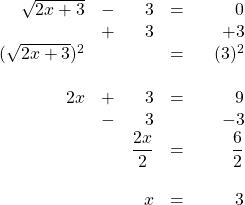
3. 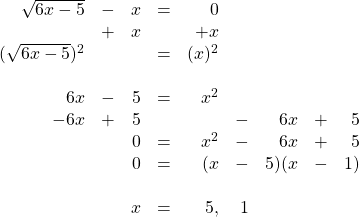
5. ![]()
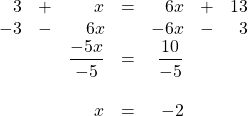
7. ![]()
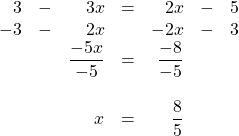
9. ![]()

11. ![]()
